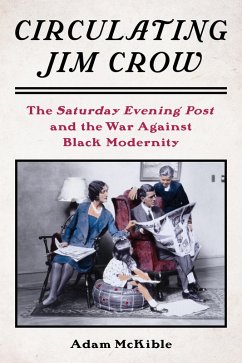In the early twentieth century, the Saturday Evening Post was perhaps the most popular and influential magazine in the United States, establishing literary reputations and shaping American culture. In the popular imagination, it is best remembered for Norman Rockwell's covers, which nostalgically depicted a wholesome and idyllic American way of life. But beneath those covers lurked a more troubling reality. Under the direction of its longtime editor, George Horace Lorimer, the magazine helped justify racism and white supremacy. It published works by white authors that made heavy use of paternalistic tropes and demeaning humor, portraying Jim Crow segregation and violence as simple common sense.
Circulating Jim Crow demonstrates how the Post used stereotypical dialect fiction to promulgate white supremacist ideology and dismiss Black achievements, citizenship, and humanity. Adam McKible tells the story of Lorimer's rise to prominence and examines the white authors who provided the editor and his readers with the caricatures they craved. He also explores how Black writers of the Harlem Renaissance pushed back against the Post and its commodified racism. McKible places the erstwhile household names who wrote for the magazine in conversation with figures such as Paul Laurence Dunbar, F. Scott Fitzgerald, Ann Petry, W. E. B. Du Bois, and William Faulkner. Revealing the role of the Saturday Evening Post in normalizing racism for millions of readers, this book also offers a new understanding of how Black writers challenged Jim Crow ideology.
Circulating Jim Crow demonstrates how the Post used stereotypical dialect fiction to promulgate white supremacist ideology and dismiss Black achievements, citizenship, and humanity. Adam McKible tells the story of Lorimer's rise to prominence and examines the white authors who provided the editor and his readers with the caricatures they craved. He also explores how Black writers of the Harlem Renaissance pushed back against the Post and its commodified racism. McKible places the erstwhile household names who wrote for the magazine in conversation with figures such as Paul Laurence Dunbar, F. Scott Fitzgerald, Ann Petry, W. E. B. Du Bois, and William Faulkner. Revealing the role of the Saturday Evening Post in normalizing racism for millions of readers, this book also offers a new understanding of how Black writers challenged Jim Crow ideology.
Dieser Download kann aus rechtlichen Gründen nur mit Rechnungsadresse in A, D ausgeliefert werden.









